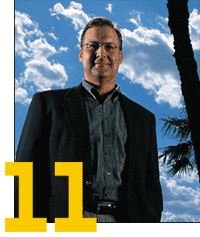John Gunn (11)

There aren't an abundance of high-tech customers in Salina, Kan. "Wheat country," explains John Gunn, president of small-business solution provider ISG Technology. And Midwesterners take great pride in fending for themselves, he says. But if you can make a compelling argument for outsourcing IT services, you've got yourself a sale, mister.
Take Murphy Tractor and Equipment, a John Deere dealer in Wichita, Kan., which hired ISG last January to manage its systems.
"It's the personal service, that's what you're getting," says Chris Voth, assistant controller at Murphy Tractor. While the company can get hardware a bit cheaper elsewhere, "I need someone to help get it set up, to deal with everyday problems," Voth says.
Two years ago, ISG wouldn't have won this customer. But Gunn, like thousands of other SMB solution providers, has transformed his business from a hardware reseller struggling to find its identity into a successful full-service solution provider that counts enterprise storage, IP telephony and videoconferencing among its core capabilities.
"Our markets are small enough that we cannot really specialize on any segments, so we deal with all kinds of businesses and institutions," Gunn says. "The move to more services is out of the need to survive and not lose my house to the creditors. Capital spending has been off since Y2K, we are in a recession, the stock market sucks, and the only thing customers still need and must have is service to keep their infrastructure working until they can upgrade."
Yes, things are tough all over. But solution providers focused on the SMB market generally have managed better than their peers, which is why Gunn was chosen to represent their ranks in this year's Top 25 Executives special report. In September, 47 percent of respondents in a CRN solution provider survey expected growth of at least 6 percent with their SMB customers. That compares with just a third of solution providers who expected similar growth with midsize and large accounts.
Gunn founded his company in 1982 as a ComputerLand franchise. Over the next decade he bought and sold other franchises, building the company to eight locations throughout the Midwest. He changed the company's name to ISG Technology about five years ago, after his ComputerLand agreement expired, because he realized the company needed a new identity to serve his customers in Kansas, Missouri and Oklahoma.
"We found ourselves still looked at as a hardware provider. ComputerLand denoted a retail store, and we were going into integrated technology solutions and shifting towards services," he says.
The strategy has worked. Five years ago, services accounted for less than 15 percent of ISG's margins. Two years ago, it was 25 percent. Today, that figure is nearly 60 percent, and Gunn wants to push it to at least 80 percent.
Getting there was not easy, however. Gunn needed to convince his salespeople to stop chasing hardware deals and focus on solutions and services. "We still fight that," he says. But once they see they can make $4,000 on a managed services deal, compared with $700 on a hardware deal, they get the picture, he says.
The transformation also called for heavy investment in new skills. It took four years and $50,000 to gain HP enterprise storage credentials and $20,000 for a Cisco IP telephony certification. But ISG has made its HP investment back tenfold. While Gunn has not yet recovered his IT telephony investment, "lots of business opportunities are popping up," he says.
Gunn paid for the investments by consolidating facilities and cutting ISG's head count to about 119, down from 170 employees two years ago. "We're a no-frills company. We watch line-item expenses. When you own a small business, and your house is on the line, you have to make it work," he says.
The result: Even though ISG's expected $42 million in sales this year is about the same as last year, profits are up because of the richer mix of service and solutions sales. "Hardware still drives our projects primarily, but we are not so dependent as we have been," he says. "When you wrap a service engagement into the hardware mix you can usually drive the margin upwards to 30 percent."
SMB solution providers could be even more successful if they realized the tremendous clout they could have with manufacturers, says Bob Stegner, vice president of channels and U.S. marketing at Ingram Micro.
"You have the relationships with the ultimate end user. You can control demand generation. You have access to decision makers," Stegner says. "I would think the strongest point that the SMB resellers have is that they don't lead with price, they lead with solutions."
CHAIRMAN, CEO AND PRESIDENT, SUN MICROSYSTEMS
Scott McNealy this year showed he is open to change, and perhaps that's one reason why he was No. 11 in the CRN Readers' Choice poll.
Not only did McNealy tone down his criticism of archrival Microsoft to focus on Sun's message, but he dropped his infamous Top 10 list,and we didn't hear the one about how Sun doesn't have to outrun the bear, just the other hikers.
A more subtle change is McNealy's embracing of Linux and Intel. It's a move that prompted one solution provider to compare him to Ken Olson of Digital Equipment. "Ken Olson said Linux will never get anywhere, and PCs are not needed," the solution provider says. "Scott said Linux will never work. And he said he will never put Solaris on the PC. Now he's eating crow."
Better to eat crow than get eaten by the bear. Many partners are still betting McNealy can stay one step ahead of the other hikers.